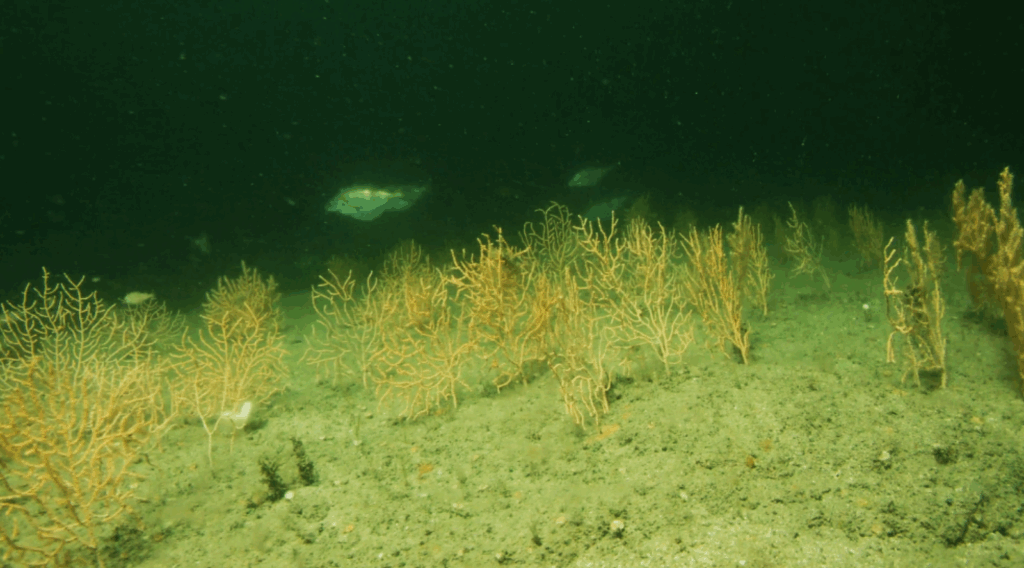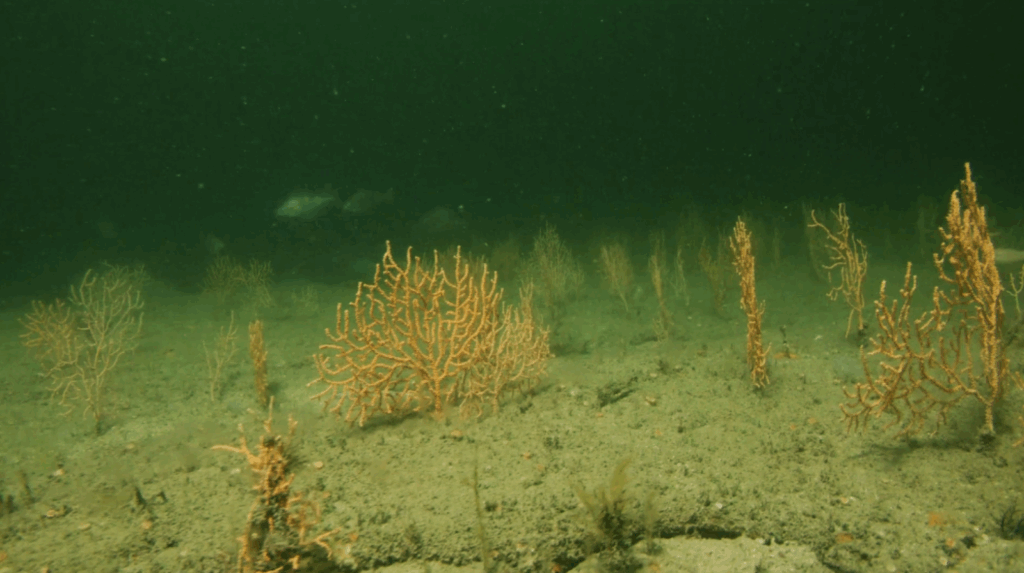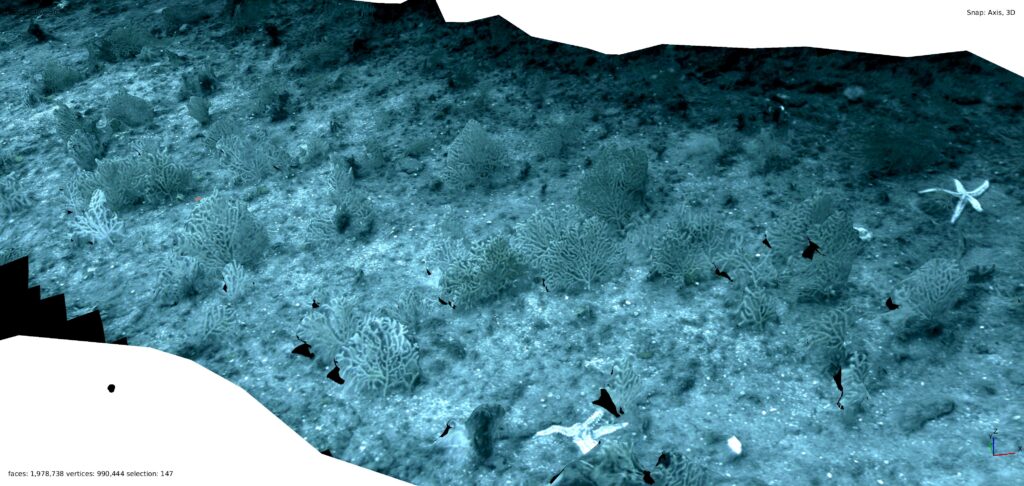Hidden but vulnerable marine treasure discovered in collaboration between the Marine Biological Association, Silverback Films and Open Planet Studios.
In an extraordinary moment of chance during the production of Ocean with David Attenborough, a vibrant and exceptionally well-preserved pink sea fan reef has been discovered off the southwest coast of England. The find, described as a “little sanctuary”, showcases a flourishing underwater habitat that has remained hidden until now.
This vibrant, undisturbed habitat, teeming with marine life, was uncovered by researchers from the Marine Biological Association (MBA) and filmmakers on Ocean with David Attenborough, and underscores both the resilience of the ocean and the urgent need to protect its hidden treasures.

“If one survey can uncover such a gem, who knows how many more treasures are hidden on the seabed?” Olly Scholey, Director at Silverback Films. © Silverback Films and Open Planet Studios
The find was made during a collaborative research project between Dr Bryce Stewart, Senior Research Fellow at the MBA and Associate Fellow at the University of Plymouth, and filmmakers from Silverback Films and Open Planet Studios. After initially discovering the reef by chance with drop down cameras, divers descended onto the reef to film it in high definition. Through a further collaboration with the underwater robotics company ‘PicSea’, the reef was then mapped in 3-D using autonomous underwater vehicles (AUVs).
“This pink sea fan reef is a stunning and significant find, a little sanctuary,” said Dr Stewart. “These delicate corals grow incredibly slowly and support a rich variety of marine life. Discovering this habitat intact gives us both an urgent reason and a rare opportunity to act now to protect it for future generations.”

The previously undiscovered sea fan reef is teeming with life. © Silverback Films and Open Planet Studios
A stunning discovery born of science and storytelling
This exceptional habitat was discovered while the team was preparing to film scenes of the seafloor for Ocean. Although much of the area they carefully surveyed before filming took place had relatively little visible life, they suddenly encountered something altogether different; an incredible marine ecosystem that appeared almost untouched by human activity. Sea fans grow only a matter of millimetres every year, and their size indicates that they have been established for a significant period of time.
“We were shocked,” said Olly Scholey, Director at Silverback Films. “What we saw on the seabed was a carpet of pink sea fans – an oasis of life hidden beneath the waves. Only by surveying the area did we discover this incredible habitat that is vulnerable to destruction. If one survey can uncover such a gem, who knows how many more treasures are hidden on the seabed.”
“When I heard the news about the sea fan site, I was very excited,” said Andrew Durrant, Founder of PicSea. “We were already honoured to be part of this project, and having the opportunity to capture an undiscovered site like this with our robots was next-level. Our georeferenced 3D reconstructions will give the team at MBA a powerful tool for assessment and protection.”

The reef, located on difficult-to-trawl terrain, may have escaped the impact of fishing thanks to its unique topography. However, its survival is far from assured.
A critical moment for marine protection
The timing of the discovery adds urgency to global conversations about ocean conservation. Coming so soon after the United Nations Ocean Conference recently held in Nice, the revelation of such a rare and pristine marine habitat bolsters the case for stronger protections in UK waters and beyond.
“There is hope – if we properly protect marine ecosystems and manage human activities sustainably, then the ocean can bounce back at an astonishing rate,” added Dr Stewart. “The evidence and insights provided by the MBA, alongside our efforts to improve fisheries management and marine conservation, help to inform better practices and influence policies that protect our oceans.”
Efforts led by Dr Stewart are already underway to secure formal protection for the site.
The role of the Marine Biological Association
This discovery is the latest example of the MBA’s leadership in ocean science, discovery and evidence that supports our understanding and conservation. For 140 years, the MBA has been at the forefront of marine research, combining rigorous fieldwork, technological innovation, and independent evidence provision that advances our understanding and protection of the marine environment.
“The MBA is instrumental in informing better ocean management,” said Dr Stewart. “This discovery, like much of our research, shows the power of science to drive conservation and influence meaningful policy.”
Working with the production team behind Ocean with David Attenborough, who areleaders in underwater cinematography, the MBA proudly supported them through research, scientific advice and technical support for some of the filming. The MBA is now excited to build on this work together in the future to help people understand the ocean and how science, story-telling and individual action can help it recover.
“This work revealed a new area that would be particularly susceptible to scallop dredging and allowed us to provide evidence towards its protection,” said Dr Stewart.
Regeneration is possible
The film underscores a hopeful message: that marine ecosystems, when protected, can recover – often more quickly than anticipated. Dr Stewart’s decades-long work with the Community of Arran Seabed Trust (COAST) in Scotland offers proof. COAST’s campaigns resulted in Scotland’s only No Take Zone and a larger Marine Protected Area off the south of the Isle of Arran, where research led by Dr Stewart has documented a remarkable recovery of marine life, including of commercially fished species such as scallops and lobsters.
“Ocean with David Attenborough shows that when we stop damaging the ocean, it recovers, and often faster than we expected,” said Dr Stewart. “But we need urgent action. Fishing with the wrong gear in the wrong place can be highly damaging, and discoveries like this reef highlight what’s still at stake.”
Watch a video of the sea fan reef discovery here. (© Silverback Films and Open Planet Studios)
What are pink sea fans?
- Pink sea fans (Eunicella verrucosa) are soft corals found primarily in the northeast Atlantic and Mediterranean.
- They can live for decades, growing only a few millimetres per year.
- These corals form essential habitats for a wide range of marine species, acting as shelter, feeding, and nursery grounds.
- Pink sea fans are protected under the Wildlife and Countryside Act in the UK and are considered a species of principal importance for conservation.
- Despite their resilience, they are highly vulnerable to physical damage from bottom-contact fishing gear and changes in water quality.
We need your help to protect this sea fan sanctuary and others like it, before it’s too late.
How you can support the MBA’s science to drive conservation and policy
Protecting newly discovered ecosystems like this sea fan reef requires ongoing science, education, and public support. Here’s how you can help:
- Donate to support independent, evidence-based marine research
- Become a Member of the MBA and join a community of ocean advocates and scientists
- Share the story – raise awareness about the importance of ocean protection by sharing this discovery with friends, schools, and local leaders
- Support Marine Protected Areas and responsible seafood choices
- Follow the MBA on social media for updates on discoveries, events, and ways to get involved.
For more information on the Marine Biological Association’s work, visit www.mba.ac.uk.

Ocean with David Attenborough takes viewers on a breathtaking journey, showing there is nowhere more vital for our survival, more full of life, wonder, or surprise, than the ocean.
Produced by Silverback Films and Open Planet Studios, stunning, immersive cinematography showcases the wonder of life under the seas and exposes the realities and challenges facing our ocean as never-before-seen, from destructive fishing techniques to mass coral reef bleaching. Through spectacular sequences featuring coral reefs, kelp forests and the open ocean, Attenborough shares why a healthy ocean keeps the entire planet stable and flourishing.
Now showing in select cinemas and available globally on National Geographic, Disney+ and Hulu.
For any enquiries relating to the film, please contact: Bethany.Hutchings@openplanet.org / Shareen.Brown@silverbackfilms.tv.